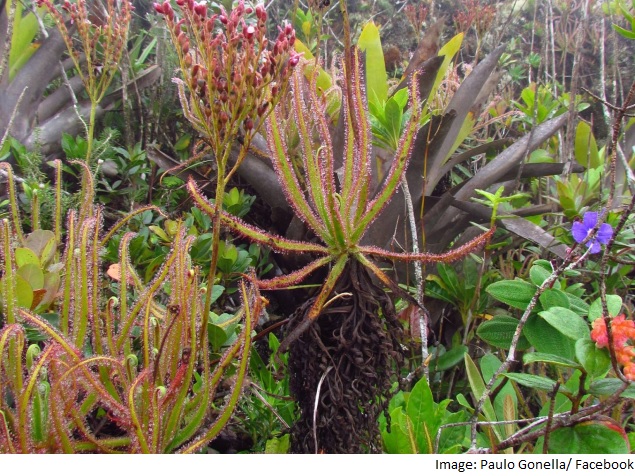- Home
- Social networking
- Social networking News
- Facebook Helps Discover New Plant Species
Facebook Helps Discover New Plant Species

The plant, which can grow up to one-and-a-half metres in length, was identified by scientists as a new species, and has since been named 'drosera magnifica', or magnificent sundew. Amateur researcher Reginaldo Vasconcelos first photographed the sundew plant in a forest on a mountain top in Minas Gerais, southeastern Brazil, in 2013, and posted it on his Facebook page.
Experts identified the plant as a new species, describing it as the second-largest carnivorous plant in the Americas, 'The Telegraph' reported. "It is the first plant that was discovered on Facebook. It is the largest sundew in the Americas, and the second-largest carnivorous plant in the Americas," said Andreas Fleischmann from the Botanical State Collection of Munich, and co-author of a research paper on the plant.
The plant has a Medusa-like tangle of sticky, carnivorous leaves that can grow up to 24cm in length and ensnare insects the size of a dragonfly.
The scientists were surprised that the large and eye-catching plant species had remained undiscovered for so long, because the mountain on which it was found was easily accessible.
However, the species, which is only found on a single mountain peak, is already considered "critically endangered". Internet-based image databases have become an "important tool" for plant enthusiasts and botanists to share their interest and knowledge, according to the researchers.
In the majority of cases, photos taken by amateurs are mostly useful in terms of providing location data that would lead to further fieldwork by experts, researchers said.
The discovery of the magnificent sundew, however, is "the first plant species to be recorded as being discovered through photographs on a social network," the researchers said in the study published in the journal Phytotaxa.
For the latest tech news and reviews, follow Gadgets 360 on X, Facebook, WhatsApp, Threads and Google News. For the latest videos on gadgets and tech, subscribe to our YouTube channel. If you want to know everything about top influencers, follow our in-house Who'sThat360 on Instagram and YouTube.
Related Stories
- Galaxy S24 Series
- MWC 2024
- Apple Vision Pro
- Oneplus 12
- iPhone 14
- Apple iPhone 15
- OnePlus Nord CE 3 Lite 5G
- iPhone 13
- Xiaomi 14 Pro
- Oppo Find N3
- Tecno Spark Go (2023)
- Realme V30
- Best Phones Under 25000
- Samsung Galaxy S24 Series
- Cryptocurrency
- iQoo 12
- Samsung Galaxy S24 Ultra
- Giottus
- Samsung Galaxy Z Flip 5
- Apple 'Scary Fast'
- Housefull 5
- GoPro Hero 12 Black Review
- Invincible Season 2
- JioGlass
- HD Ready TV
- Laptop Under 50000
- Smartwatch Under 10000
- Latest Mobile Phones
- Compare Phones
- Huawei Pura 70 Pro+
- Huawei Pura 70 Ultra
- Tecno Camon 30 Premier 5G
- Motorola Edge 50 Fusion
- Oppo A1i
- Oppo A1s
- Motorola Edge 50 Ultra
- Leica Leitz Phone 3
- Asus ZenBook Duo 2024 (UX8406)
- Dell Inspiron 14 Plus
- Realme Pad 2 Wi-Fi
- Redmi Pad Pro
- Cult Shock X
- Fire-Boltt Oracle
- Samsung Samsung Neo QLED 8K Smart TV QN800D
- Samsung Neo QLED 4K Smart TV (QN90D)
- Sony PlayStation 5 Slim Digital Edition
- Sony PlayStation 5 Slim
- IFB 2 Ton 3 Star Inverter Split AC (CI2432C323G1)
- Daikin 1 Ton 3 Star Inverter Split AC (FTKL35UV16W+RKL35UV16W)

















